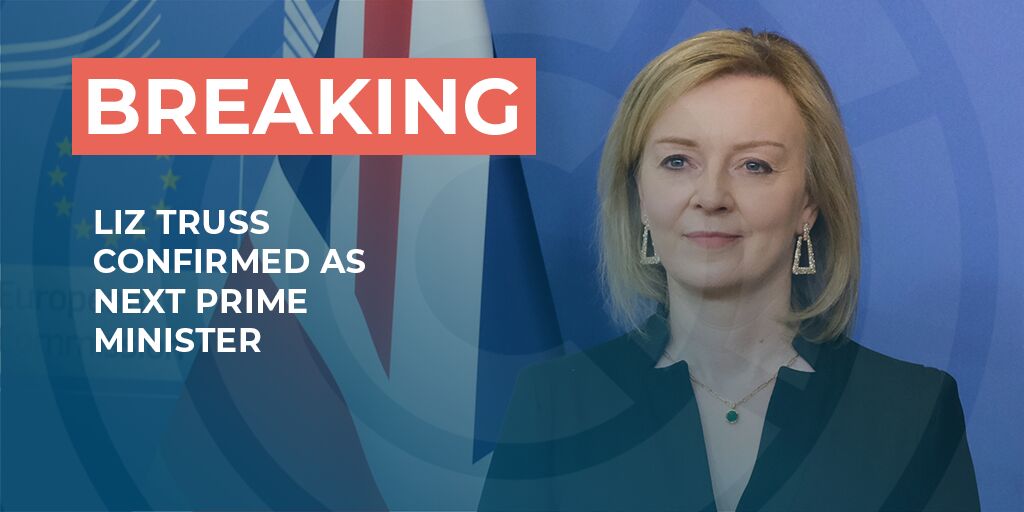Q&A: Who is Liz Truss?

The battle to become the new leader of the Conservative Party and Britain’s new Prime Minister has drawn to a close. Liz Truss, the former Foreign Secretary, has been voted as the victor by her fellow party members. For some time Truss had been the favourite to replace Boris Johnson after opening up an early lead in the race to win the leadership.
From the outset of her campaign, Truss declared that she will “hit the ground running” as Prime Minister. Here’s a closer look at what we know so far…
Q: Who is Liz Truss?
Truss, born in Oxford in 1975 to left-leaning parents, went to a state school before reading Philosophy, Politics and Economics at the University of Oxford. After graduating, Truss gained a decade of experience in various roles before entering politics professionally.
Since 2010 Truss has been the Member of Parliament for South-West Norfolk and she has held multiple Cabinet positions, including Secretary of State for Environment, Food and Rural Affairs (2014-2016), Secretary of State for Justice (2016), Minister for Women and Equalities (2019-) and Foreign Secretary (2021-).
Q: How should we expect her to tackle the cost-of-living crisis?
In order to tackle the ever-evolving cost-of-living crisis, Truss has vowed to introduce no additional taxes, to reverse the National Insurance rise, to cut the planned corporation tax rise from 19 per cent to 25 per cent and to suspend the green levy. She has said her priority would be to “make sure we’re not taking money from people in tax and then giving it back to them in handouts”, but has also been reluctant to spell out exactly what her plans would entail until entering Downing Street.
Q: What has she said about rising energy costs?
Truss has promised to tackle the rising energy costs by acting immediately, lowering the tax burden and focusing on increasing energy supplies. Additionally, she has maintained that any support payments that are made available by the Government will be targeted to help the most vulnerable.
One of the first provisions of her promised “robust” support will be the October payment, spread across six instalments, which will give an extra £400 to about 29 million people to help with their energy bills.
Q: What is her stance on the war in Ukraine?
As the former Foreign Secretary, Truss has been at the heart of working to resolve the conflict in Ukraine. At the International Ministerial Conference on Freedom of Religion and Belief (FoRB) in July she addressed the Ukrainian delegates who were present, stating, “the UK will not rest until you prevail and until your people are free to live, believe and thrive”.
Truss has previously stated that she does not support sending British soldiers to Ukraine to help fight against Russia, ruling out “direct involvement”. However, she is committed to doing all that we can to help support Ukrainians, playing a pivotal role in leading the international coalition on sending weapons and ensuring sanctions are put in place. She has also pledged to increase defence spending by 3% by 2030.
Q: Where does she stand on the Union?
Whilst Truss voted Remain in the 2016 EU referendum she has pledged to “deliver on the vast opportunities” that Brexit presents. She has been a long-term advocate of keeping the Union together and has tended to vote against transferring more power to the Scottish Parliament. Truss has often publicly commented on the fact she doesn’t want a second Scottish referendum.
Q: What has she said on freedom of religion or belief?
In July this year, Truss gave the opening speech at the FoRB Ministerial Conference. Quoting Paul’s words to the Corinthian church, Truss encouraged those attending the conference to “be on guard, stand firm, be courageous, be strong”, and to work together to bring about positive change for people of all faiths and none across all nations.
Truss has taken a strong stand on freedom of religion and belief on other occasions during her time as foreign secretary. She strongly condemned an anti-Semitic act of terrorism at a Texas synagogue earlier this year and has voiced her commitment to deepening UK relations with allies and partners around the world to build a Network of Liberty.
Q: What has Truss said on start and end of life issues?
Truss has largely abstained from voting on abortion. For instance, she abstained on the decriminalisation of abortion in England and Wales in 2017 and on the 2022 bill to introduce a ‘pills by post’ scheme during the pandemic (which would enable women to terminate their pregnancies at home). However, she voted in favour of imposing abortion upon Northern Ireland.
Truss has never voted on allowing terminally ill people to be given assistance to end their life.
Q: What are her views on transgenderism?
Throughout her time as the Minister for Women and Equalities, it was widely known that she argued against “woke” attitudes about race, gender and sexuality. Many of Truss’ comments on gender align with the ‘gender-critical’ argument that sex is biological and immutable and she has repeatedly said when asked at hustings for the Leadership Election that ‘trans-women are not women’.
Q: What has she said about the Online Safety Bill?
The Online Safety Bill is due to return to the House of Commons this autumn. Truss has said that she will pause the Bill and re-examine it upon entering no. 10. Whilst championing the principle under-18s must be protected from damaging content damaging, she has said that she is also committed to upholding free speech. She stated at the GB News hustings that the Bill should reflect the important principle that “it should be the same online as it is offline”.
Share